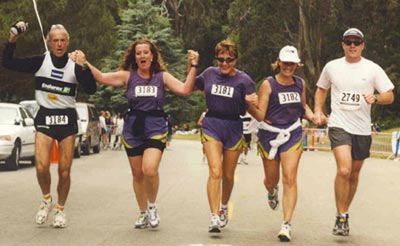
MARATHONING 101:
A KNOT IN YOUR COUNTING ROPE
(Doesn’t your fitness resume deserve a marathon? Learn how to train for the ultimate challenge and still have a life.)
Elaine Doll-Dunn, Psy.D.
DREAM IT, DARE IT, DO IT…
 Have you said it yet? Have you articulated those immutable words, “I’m going to run a marathon!” If you have, and you’re now wondering what’s wrong with your head, cheer up. It’s called the rite of passage, the power of one, the ‘it’s time for me’ proclamation. Still the most challenging of events, the marathon defines the person you are, the person you want to be, and the person you become.
Have you said it yet? Have you articulated those immutable words, “I’m going to run a marathon!” If you have, and you’re now wondering what’s wrong with your head, cheer up. It’s called the rite of passage, the power of one, the ‘it’s time for me’ proclamation. Still the most challenging of events, the marathon defines the person you are, the person you want to be, and the person you become.
Welcome to the ranks of those who live outside the box.
A prodigious distance, an awesome accomplishment, you owe yourself this conquest…and training is the key. So if you have chosen the full or the half for your distance debut, the following suggestions will be beneficial to a comfortable finish and solid accomplishment.
1. Make a commitment. Write it down, tell your friends, and make it a priority. Circle the date of your chosen event on the calendar, secure whatever reservations you need, and register NOW!
2. Tape a schedule to your refrigerator, plan the time for your daily workout, and make it a habit.
3. Get good shoes. If you don’t already have two pair of good running shoes, make a trip to your trusted shoe guy; it’s a small investment, worth it in the long run (pun intended). Two pair because it’s good to rotate; 400 miles on a pair of shoes and they should be history. Don’t be sabotaged by an injury.
4. Find a running buddy. It really helps to get you out in the morning if someone else is depending on you, and company helps make the miles go by more quickly.
5. Plan your running venue. Pick safe places and forgiving surfaces. Parks, trails, asphalt instead of concrete, grass.
6. Determine your goal. Is it to finish? Better a previous time? Qualify for Boston? The race reflects the training.
7. Give yourself plenty of training time. You should be able to run comfortably for 30 minutes four times a week before beginning the 18 week formal schedule. If you factor in some extra time you won’t be sabotaged by a family emergency, ill health, or an injury, you will still have time to complete your base work.
8. Focus on the long runs. The most important part of any marathon training program is the long run. The purpose of these runs is to strengthen your legs and body and to develop the fitness of your cardiovascular system so that they can withstand the rigors of the marathon distance. Walk and run, the goal is time on your feet for your body and for your head. If you walk for one minute out of every mile, you erase the fatigue in your legs and are refreshed for another part of a mile...
9. Keep a running log. Training logs are great motivators and a good history to refer to over time; weight, speed, general health can usually be related back to time and task in your log.
10. Listen to your body. Staying healthy is imperative. You must train enough to achieve proper conditioning, but not so much that it leads to exhaustion, injury, or illness. It’s a balancing act, and runners are notoriously addicted to over-training.
Cyclical training, in which you vary the timing, intensity, and duration of your workouts, is the secret to running marathons. Arthur Lydiard of New Zealand proved it works, and since the 1940’s people have been honing his rudimentary training and pushing the running envelope to new times and distances.
Your body shouldn’t be able to complete a marathon; it flouts human physiology by doing so. Our glycogen supply is depleted after 90 minutes of intense aerobic exercise, that’s what experienced marathoners speak of as “the wall.” Believe it or not, the human body does shut down when it runs out of gas, as does a Lamborghini. So then what? You suck down a PowerGel, suck-up your attitude, and go with guts for the last 26.2.
Sound like something you want to commit to? Join the maniacal masses. If you can run a mile today, you can finish a marathon six months from now. But every workout must push toward this goal. It’s a great way to learn some things about yourself, ready for revelation? Well then…let’s go. Run well, run happy, run smart.

18 Week Marathon Training Schedule
12 Week Half-Marathon Training Schedule
Both of these schedules are designed for an intermediate runner with a consistent running base.
Training for the Novice
Ten key points for preparing to run a marathon
Rank Beginner Program
The schedule before you start a schedule
Contact Elaine for a training program designed especially for you:
edoll@rushmore.com

 Have you said it yet? Have you articulated those immutable words, “I’m going to run a marathon!” If you have, and you’re now wondering what’s wrong with your head, cheer up. It’s called the rite of passage, the power of one, the ‘it’s time for me’ proclamation. Still the most challenging of events, the marathon defines the person you are, the person you want to be, and the person you become.
Have you said it yet? Have you articulated those immutable words, “I’m going to run a marathon!” If you have, and you’re now wondering what’s wrong with your head, cheer up. It’s called the rite of passage, the power of one, the ‘it’s time for me’ proclamation. Still the most challenging of events, the marathon defines the person you are, the person you want to be, and the person you become. 